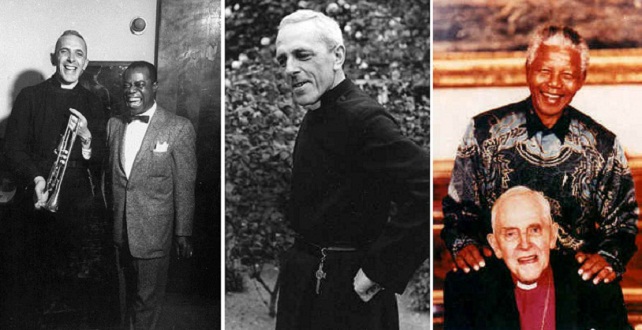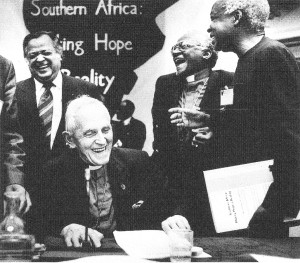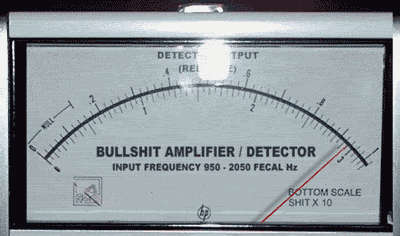[ cross-posted from Zenpundit — a warrior, a monk, and where that leaves me ]
.
In the first part of this post I introduced you to my father, Captain OG Cameron DSC, RN, the man who fueled my keen interest in gallantry and the martial side of things. The other great influence in my early life was Fr. Trevor Huddleston CR, pictured below:

.
Trevor Huddleston CR:
Archbishop the Most Reverend Sir Ernest Urban Trevor Huddleston CR, KCMG it’s hard even to know how to string his titles together, this monk, priest, schoolteacher, activist, archbishop, finally knighted by Her Majesty towards the end of his long and eventful life was the man who became a second father, guardian, mentor and spiritual guide to me shortly after my father died when I was nine.
That’s the man as I knew him, Father Trevor — simple, caring, intelligent, perhaps a little austere even — in the middle image above.
Austerity, simplicity: two more words to set beside gallantry in the lexicon of admiration and gratitude.
.
Satchmo:
To the left in the same image, he’s shown with Louis Armstrong — Satchmo — who has just presented him with a trumpet.
The story goes like this: as a monk in an Anglican monastic order, the Community of the Resurrection popularly known as the Mirfield Fathers, Father Trevor was sent to South Africa while still a young man, and worked in Sophiatown, just outside Johannesberg, as a priest and teacher.
A young black kid in one of his classes, Hugh, aged 12 or 13, fell ill and was taken to hospital, where Trevor Huddleston visited him. Trevor asked him what he would like more than anything in this world, what would so thrill and please him that he would have the greatest possible motive for getting better, getting out of the hospital and back to school. Hugh said, “a trumpet, Father” — so Trevor got hold of a trumpet which he then presented to the boy: now known the world over as the great jazz trumpeter, Hugh Masekela.
That wasn’t quite enough, though. A year or three later, Trevor was in the United States, and met Satchmo, who asked if there was anything he could do to help… Trevor told Satchmo he’d started a jazz band for the kids in his school, and knew a boy who would just love a trumpet…
Trevor was a hard man to refuse.
.
Hugh Masekela:
Here’s Hugh Masekela, just a little older, with the trumpet Trevor brought him from Louis Armstrong:

And here’s the sound…
When I was maybe 15, and Trevor had returned from South Africa to England, he gave me a 7″ “45” record of the Huddleston Jazz Band — now long lost. Imagine my amazed delight to be able to hear that sound again, fifty years later, through the good graces of the internet —
Hugh Masekela and the Huddleston Jazz Band play Ndenzeni na?
.
Desmond Tutu:
Another story I like to tell about Trevor and his time in South Africa has to do with a lady…
It seems this young black kid aged about 8 or 9 was sitting with his mother on the “stoop” outside his house in a South African shanty-town when a white priest walked by and doffed his hat to the boy’s mother.
The boy could hardly grasp how this had happened — his mother was a black woman, as one might say, “of no special acount”. But the priest in question was Trevor Huddleston, and it was a natural courtesy for him to lift his hat in greeting a lady…
The young boy never quite recovered from this encounter. We know him now as the Nobel Peace laureate, Archbishop Desmond Tutu.

Here’s a photo of four old friends — Huddleston, Tutu, Julius Nyerere of Tanzania, and former Commonwealth Secretary General Shridath Ramphal.
.
From individuals to the world:
These are two simple stories of how Fr Trevor simply and straightforwardly loved whomever was before him, regardless of the enormous pressure at the time to discriminate between “real” and “insignificant” people — a love which made an indelible mark on those whose lives it touched.
And when Father Trevor touched you, as Lord Buckley might say, you stayed touched.
Thus far I’ve been focusing on individuals that Trevor touched. I do not think he in fact saw more than one person at a time, and his responses to situations were geared directly to the service of his love.
It was because of this that while he was in South Africa, Trevor repeatedly and quite literally put his life on the line in defence of the very simple proposition that the color of a person’s skin was immaterial in view of the love that was possible between any two people — so perhaps here’s where I should mention some of that history and some of the honors it brought him. After all, Trevor did pretty much take on the government of the South Africa he so loved, and lived to see it change.
.
Bishop Trevor of Sophiatown
Trevor Huddleston was a founding member of the African National Congress, the author of the first non-fiction work (Naught for Your Comfort, more on that later) to critique his beloved South Africa’s apartheid policy, reviled publically for meddling in politics by an Archbishop of Canterbury who later declared he had been in error and that Fr Trevor was about as close to a saint as one could find.
In 1955, Father Trevor, along with Yusuf Dadoo and Chief Albert Luthuli, was awarded the Isitwalandwe, the highest award given by the African National Congress. He was awarded the United Nations Gold Medal in recognition of his contribution to the international campaign against apartheid, the highest awards from both Zambia and Nigeria, the Dag Hammerskjold Award for Peace, the Indira Gandhi Memorial Prize, and ten honorary doctorates, including that of his alma mater, Oxford.
Archbishop Huddleston initiated the “International Declaration for the Release of Nelson Mandela and all Political Prisoners” in 1982, took part in the televised “International Tribute for a Free South Africa” held at Wembley Stadium, London in 1990 during which he introduced the address by Nelson Mandela (see below), entered South Africa House, Trafalgar Square, London in 1994 to vote in the first South African democratic election, and was a guest at President Mandela’s inauguration in Pretoria that year.
He received the KCMG (Knight Commander of the Order of St. Michael and St. George) in the 1998 New Year Honours list, for “Services to UK-South African Relations”, and attended an Investiture at Buckingham Palace on March 24th, 1998, to receive this honour from HM the Queen.
He chose the designation, “Bishop Trevor of Sophiatown”.
.
Nelson Mandela:
But let’s go back to individuals, and to Nelson Mandela in particular.
Mandela and Trevor were comrades in the fight against apartheid from the beginning — and the richness of their friendship is visible in the photo of Mandela with his arms on Trevor’s shoulders in the right hand panel at the top of this page.
In his autobiography, Long Walk to Freedom, Mandela tells the story of a time when he and Walter Sisulu were approached by a group of South African police who had been ordered to arrest them. Trevor, who was talking with with the two of them, called out to the cops, “No, you must arrest me instead, my dears.”
It’s that “my dears” that gives the game away. I can hear those words in Trevor’s voice. Even the cops were dear to Trevor: he might be utterly opposed to what they were doing, and risk his life to oppose them but they were children of God.
Here’s a video of Trevor’s speech introducing Mandela at Wembley — a political speech, to be sure, but one powered by religious conviction.
.
Mandela’s tribute:
I’m saving the best of what Fr. Trevor taught me for the third post in this series, and hope to wrap the series up with some of my own reflections in a fourth; here I’d like to close with the words Mandela wrote about his friend after Trevor’s death in 1998:
It is humbling for an ordinary mortal like myself to express the deep sense of loss one feels at the death of so great and venerable figure as Father Trevor Huddleston.
.
Father Huddleston was a pillar of wisdom, humility and sacrifice to the legions of freedom fighters in the darkest moments of the struggle against apartheid. At a time when identifying with the cause of equality for all South Africans was seen as the height of betrayal by the privileged, Father Huddleston embraced the downtrodden. He forsook all that apartheid South Africa offered the privileged minority. And he did so at great risk to his personal safety and well-being.
.
On behalf of the people of South Africa and anti-apartheid campaigners across the world, I convey my deepest condolences to his Church, his friends and his colleagues. Isithwalandwe Trevor Huddleston belonged to that category of men and women who make the world the theatre of their operation in pursuit of freedom and justice.
.
He brought hope, sunshine and comfort to the poorest of the poor. Not only was he a leader in the fight against oppression. He was also father and mentor to many leaders of the liberation movement, most of whom now occupy leading positions in all spheres of public life in our country. His memory will live in the hearts of our people.




